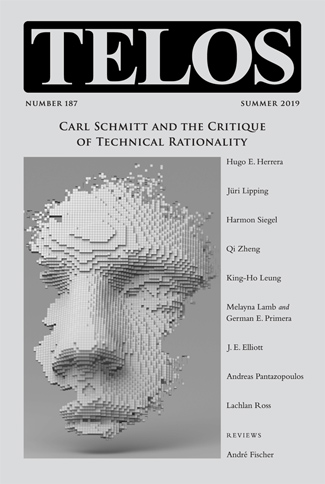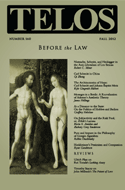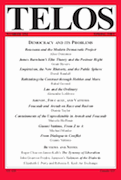By King-Ho Leung · Thursday, July 18, 2019 King-Ho Leung’s “Living Paradoxes: On Agamben, Taylor, and Human Subjectivity” appears in Telos 187 (Summer 2019). Read the full article at the Telos Online website, or purchase a print copy of the issue in our online store. Individual subscriptions to Telos are available in both print and online formats.
 Over the last two decades, Giorgio Agamben and Charles Taylor have produced important and influential genealogical works on the philosophical and political conceptions of secularity. Yet in their recent work, both of these thinkers have respectively returned to a prominent theme in their earlier works: human life. This essay offers a parallel reading of Agamben and Taylor as post-Heideggerian critics of the modern conception of human subjectivity. Through examining these their respective characterizations of modern subjectivity—namely, Taylor’s account of the “disengaged self” and Agamben’s conception of the “excluded-included” bare life—this essay seeks to highlight not only the Heideggerian currents underlying the philosophical anthropologies of Agamben and Taylor, but also the ontological paradoxicalities they detect in the conception of human existence and subjectivity in politico-philosophical modernity. After reviewing the different aspects of Agamben’s and Taylor’s critiques of modern subjectivity as well as the traditional metaphysical conception of humans as “language animals,” this essay concludes by sketching a robust and affirmative “paradoxical” conception of human beings as “language animals” that simultaneously takes into account the insights from Taylor’s (post)analytic philosophical renewal of Aristotelianism and Agamben’s critical analysis of contemporary biopolitics in the continental philosophical tradition. Over the last two decades, Giorgio Agamben and Charles Taylor have produced important and influential genealogical works on the philosophical and political conceptions of secularity. Yet in their recent work, both of these thinkers have respectively returned to a prominent theme in their earlier works: human life. This essay offers a parallel reading of Agamben and Taylor as post-Heideggerian critics of the modern conception of human subjectivity. Through examining these their respective characterizations of modern subjectivity—namely, Taylor’s account of the “disengaged self” and Agamben’s conception of the “excluded-included” bare life—this essay seeks to highlight not only the Heideggerian currents underlying the philosophical anthropologies of Agamben and Taylor, but also the ontological paradoxicalities they detect in the conception of human existence and subjectivity in politico-philosophical modernity. After reviewing the different aspects of Agamben’s and Taylor’s critiques of modern subjectivity as well as the traditional metaphysical conception of humans as “language animals,” this essay concludes by sketching a robust and affirmative “paradoxical” conception of human beings as “language animals” that simultaneously takes into account the insights from Taylor’s (post)analytic philosophical renewal of Aristotelianism and Agamben’s critical analysis of contemporary biopolitics in the continental philosophical tradition.
Continue reading →
By Sarah Earnshaw · Tuesday, March 21, 2017 In response to a speech given by Obama in 2013 on his administration’s counterterrorism policy, popularly referred to as his “drone speech,” General William Nash commented that Obama “has begun the transition from a perpetual war to a more normalized security framework.” I address this normalization of the categorization and control of life within a global threatscape. Much of the debate at policy level, in academia, and on the flickering screens of media outlets surrounding the contemporary fixture of the counterterror arsenal, the drone, focuses upon the legal and ethical implications. Administration officials continually stress the need for “transparency” and the president’s wish that the United States hold itself to “the highest possible standards” in the conduct of a just, humanitarian war—reminding us this is indeed a war, against an organization and its affiliates.
Continue reading →
Kevin S. Amidon and Zachary Gray Sanderson’s “On Subjectivity and the Risk Pool; or, Žižek’s Lacuna” appears in Telos 160 (Fall 2012). Read the full version online at the Telos Online website, or purchase a print copy of the issue here.
 In his In Defense of Lost Causes, Slavoj Žižek poses more than a few heavy-gauge questions. Foremost among them: “The only true question today is: do we endorse this ‘naturalization’ of capitalism, or does contemporary global capitalism contain antagonisms which are sufficiently strong to prevent its infinite reproduction?” Žižek’s analysis of this question, however, seems to us to be missing a crucial element. Where Žižek seems to posit a kind of reconvergence of the classical autonomous subject of the (neo-)liberal (and Frankfurt School) traditions with the class-based vocabulary of more radical Marxist and Lacanian analyses, we see another layer: the subject under the condition of the risk pool. The risk pool, protean and ubiquitous in today’s political economy, takes form in those meta-structures of institutionalized financial, political, and medical (i.e. bio-political) insurance and quasi-insurance that do not so much control the subject’s spheres of activity as regulate them. The (voluntarily or involuntarily) risk-pooled human being is thus in many ways neither subject nor class. She is always both, and navigating always between them in the sphere of financially and actuarially mediated risk. Such navigation in many ways evacuates the forms of political agency posited in both liberal and Marxist traditions, and focuses the individual centrally on the problem of uncertainty. Žižek’s complex analyses of topics as diverse as terrorism and Christianity approach reflections like these, but end where they must in fact begin. In his In Defense of Lost Causes, Slavoj Žižek poses more than a few heavy-gauge questions. Foremost among them: “The only true question today is: do we endorse this ‘naturalization’ of capitalism, or does contemporary global capitalism contain antagonisms which are sufficiently strong to prevent its infinite reproduction?” Žižek’s analysis of this question, however, seems to us to be missing a crucial element. Where Žižek seems to posit a kind of reconvergence of the classical autonomous subject of the (neo-)liberal (and Frankfurt School) traditions with the class-based vocabulary of more radical Marxist and Lacanian analyses, we see another layer: the subject under the condition of the risk pool. The risk pool, protean and ubiquitous in today’s political economy, takes form in those meta-structures of institutionalized financial, political, and medical (i.e. bio-political) insurance and quasi-insurance that do not so much control the subject’s spheres of activity as regulate them. The (voluntarily or involuntarily) risk-pooled human being is thus in many ways neither subject nor class. She is always both, and navigating always between them in the sphere of financially and actuarially mediated risk. Such navigation in many ways evacuates the forms of political agency posited in both liberal and Marxist traditions, and focuses the individual centrally on the problem of uncertainty. Žižek’s complex analyses of topics as diverse as terrorism and Christianity approach reflections like these, but end where they must in fact begin.
Continue reading →
By Marcelo Hoffman · Friday, April 22, 2011 Marcelo Hoffman’s “Containments of the Unpredictable in Arendt and Foucault” appears in Telos 154 (Spring 2011). Read the full version at TELOS Online website.
 This article takes as its principal provocation Giorgio Agamben’s claim that Hannah Arendt’s analyses of totalitarianism do not obtain a biopolitical perspective and that, conversely, Michel Foucault’s analyses of biopolitics fall short of adequately addressing totalitarian states, thereby leaving us with mutually compatible absences. I offer an alternative to this dichotomous reading that ultimately develops into a critique of Arendt’s treatment of birth. I suggest that even as Arendt’s analyses of totalitarianism and Foucault’s analyses of biopolitics express diverging arguments about transformations in Western political theory and practice, they nevertheless accentuate the production of predictable states of life. In light of this broad affinity, what stands out is Arendt’s identification of birth as a source of the disruption of predictable states of life whereas Foucault implicitly contests the disruptive potential of birth. This difference matters because it opens up a critical space wherein Arendt appears to fall back on a biological position that she eschews elsewhere and wherein Foucault provides a much-needed remedy to this position. This article takes as its principal provocation Giorgio Agamben’s claim that Hannah Arendt’s analyses of totalitarianism do not obtain a biopolitical perspective and that, conversely, Michel Foucault’s analyses of biopolitics fall short of adequately addressing totalitarian states, thereby leaving us with mutually compatible absences. I offer an alternative to this dichotomous reading that ultimately develops into a critique of Arendt’s treatment of birth. I suggest that even as Arendt’s analyses of totalitarianism and Foucault’s analyses of biopolitics express diverging arguments about transformations in Western political theory and practice, they nevertheless accentuate the production of predictable states of life. In light of this broad affinity, what stands out is Arendt’s identification of birth as a source of the disruption of predictable states of life whereas Foucault implicitly contests the disruptive potential of birth. This difference matters because it opens up a critical space wherein Arendt appears to fall back on a biological position that she eschews elsewhere and wherein Foucault provides a much-needed remedy to this position.
Continue reading →
|
|
 Over the last two decades, Giorgio Agamben and Charles Taylor have produced important and influential genealogical works on the philosophical and political conceptions of secularity. Yet in their recent work, both of these thinkers have respectively returned to a prominent theme in their earlier works: human life. This essay offers a parallel reading of Agamben and Taylor as post-Heideggerian critics of the modern conception of human subjectivity. Through examining these their respective characterizations of modern subjectivity—namely, Taylor’s account of the “disengaged self” and Agamben’s conception of the “excluded-included” bare life—this essay seeks to highlight not only the Heideggerian currents underlying the philosophical anthropologies of Agamben and Taylor, but also the ontological paradoxicalities they detect in the conception of human existence and subjectivity in politico-philosophical modernity. After reviewing the different aspects of Agamben’s and Taylor’s critiques of modern subjectivity as well as the traditional metaphysical conception of humans as “language animals,” this essay concludes by sketching a robust and affirmative “paradoxical” conception of human beings as “language animals” that simultaneously takes into account the insights from Taylor’s (post)analytic philosophical renewal of Aristotelianism and Agamben’s critical analysis of contemporary biopolitics in the continental philosophical tradition.
Over the last two decades, Giorgio Agamben and Charles Taylor have produced important and influential genealogical works on the philosophical and political conceptions of secularity. Yet in their recent work, both of these thinkers have respectively returned to a prominent theme in their earlier works: human life. This essay offers a parallel reading of Agamben and Taylor as post-Heideggerian critics of the modern conception of human subjectivity. Through examining these their respective characterizations of modern subjectivity—namely, Taylor’s account of the “disengaged self” and Agamben’s conception of the “excluded-included” bare life—this essay seeks to highlight not only the Heideggerian currents underlying the philosophical anthropologies of Agamben and Taylor, but also the ontological paradoxicalities they detect in the conception of human existence and subjectivity in politico-philosophical modernity. After reviewing the different aspects of Agamben’s and Taylor’s critiques of modern subjectivity as well as the traditional metaphysical conception of humans as “language animals,” this essay concludes by sketching a robust and affirmative “paradoxical” conception of human beings as “language animals” that simultaneously takes into account the insights from Taylor’s (post)analytic philosophical renewal of Aristotelianism and Agamben’s critical analysis of contemporary biopolitics in the continental philosophical tradition.  In his In Defense of Lost Causes, Slavoj Žižek poses more than a few heavy-gauge questions. Foremost among them: “The only true question today is: do we endorse this ‘naturalization’ of capitalism, or does contemporary global capitalism contain antagonisms which are sufficiently strong to prevent its infinite reproduction?” Žižek’s analysis of this question, however, seems to us to be missing a crucial element. Where Žižek seems to posit a kind of reconvergence of the classical autonomous subject of the (neo-)liberal (and Frankfurt School) traditions with the class-based vocabulary of more radical Marxist and Lacanian analyses, we see another layer: the subject under the condition of the risk pool. The risk pool, protean and ubiquitous in today’s political economy, takes form in those meta-structures of institutionalized financial, political, and medical (i.e. bio-political) insurance and quasi-insurance that do not so much control the subject’s spheres of activity as regulate them. The (voluntarily or involuntarily) risk-pooled human being is thus in many ways neither subject nor class. She is always both, and navigating always between them in the sphere of financially and actuarially mediated risk. Such navigation in many ways evacuates the forms of political agency posited in both liberal and Marxist traditions, and focuses the individual centrally on the problem of uncertainty. Žižek’s complex analyses of topics as diverse as terrorism and Christianity approach reflections like these, but end where they must in fact begin.
In his In Defense of Lost Causes, Slavoj Žižek poses more than a few heavy-gauge questions. Foremost among them: “The only true question today is: do we endorse this ‘naturalization’ of capitalism, or does contemporary global capitalism contain antagonisms which are sufficiently strong to prevent its infinite reproduction?” Žižek’s analysis of this question, however, seems to us to be missing a crucial element. Where Žižek seems to posit a kind of reconvergence of the classical autonomous subject of the (neo-)liberal (and Frankfurt School) traditions with the class-based vocabulary of more radical Marxist and Lacanian analyses, we see another layer: the subject under the condition of the risk pool. The risk pool, protean and ubiquitous in today’s political economy, takes form in those meta-structures of institutionalized financial, political, and medical (i.e. bio-political) insurance and quasi-insurance that do not so much control the subject’s spheres of activity as regulate them. The (voluntarily or involuntarily) risk-pooled human being is thus in many ways neither subject nor class. She is always both, and navigating always between them in the sphere of financially and actuarially mediated risk. Such navigation in many ways evacuates the forms of political agency posited in both liberal and Marxist traditions, and focuses the individual centrally on the problem of uncertainty. Žižek’s complex analyses of topics as diverse as terrorism and Christianity approach reflections like these, but end where they must in fact begin.  This article takes as its principal provocation Giorgio Agamben’s claim that Hannah Arendt’s analyses of totalitarianism do not obtain a biopolitical perspective and that, conversely, Michel Foucault’s analyses of biopolitics fall short of adequately addressing totalitarian states, thereby leaving us with mutually compatible absences. I offer an alternative to this dichotomous reading that ultimately develops into a critique of Arendt’s treatment of birth. I suggest that even as Arendt’s analyses of totalitarianism and Foucault’s analyses of biopolitics express diverging arguments about transformations in Western political theory and practice, they nevertheless accentuate the production of predictable states of life. In light of this broad affinity, what stands out is Arendt’s identification of birth as a source of the disruption of predictable states of life whereas Foucault implicitly contests the disruptive potential of birth. This difference matters because it opens up a critical space wherein Arendt appears to fall back on a biological position that she eschews elsewhere and wherein Foucault provides a much-needed remedy to this position.
This article takes as its principal provocation Giorgio Agamben’s claim that Hannah Arendt’s analyses of totalitarianism do not obtain a biopolitical perspective and that, conversely, Michel Foucault’s analyses of biopolitics fall short of adequately addressing totalitarian states, thereby leaving us with mutually compatible absences. I offer an alternative to this dichotomous reading that ultimately develops into a critique of Arendt’s treatment of birth. I suggest that even as Arendt’s analyses of totalitarianism and Foucault’s analyses of biopolitics express diverging arguments about transformations in Western political theory and practice, they nevertheless accentuate the production of predictable states of life. In light of this broad affinity, what stands out is Arendt’s identification of birth as a source of the disruption of predictable states of life whereas Foucault implicitly contests the disruptive potential of birth. This difference matters because it opens up a critical space wherein Arendt appears to fall back on a biological position that she eschews elsewhere and wherein Foucault provides a much-needed remedy to this position. 

